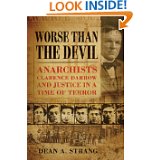 I’ve recently finished reading Dean Strang’s fascinating new book, “Worse Than the Devil: Anarchists, Clarence Darrow, and Justice in a Time of Terror.” The book recounts the story of a once-famous (or infamous) criminal case that was tried in Milwaukee nearly a century ago. The case arose from a short, armed skirmish between police and residents of Milwaukee’s largely Italian, working-class Bay View neighborhood in September 1917. In the wake of that violence, police indiscriminately arrested dozens of Italian immigrants, ultimately resulting in the trial of eleven suspected anarchists in November 1917 on charges of assault with intent to murder.
I’ve recently finished reading Dean Strang’s fascinating new book, “Worse Than the Devil: Anarchists, Clarence Darrow, and Justice in a Time of Terror.” The book recounts the story of a once-famous (or infamous) criminal case that was tried in Milwaukee nearly a century ago. The case arose from a short, armed skirmish between police and residents of Milwaukee’s largely Italian, working-class Bay View neighborhood in September 1917. In the wake of that violence, police indiscriminately arrested dozens of Italian immigrants, ultimately resulting in the trial of eleven suspected anarchists in November 1917 on charges of assault with intent to murder.
America’s recent entry into the First World War had already created a public atmosphere that was hardly favorable to immigrants and political dissidents, but a terrible local tragedy may have wiped out any remaining hope that the defendants would receive a fair trial. Just days before the jury was selected, a bomb exploded in a Milwaukee police station, killing ten — America’s single greatest loss of officers in the line of duty before 9/11. Although the Bay View defendants were not formally charged with this crime — indeed, the case was never solved and no one was ever formally charged — the bombing was widely believed to be the work of the defendants’ supporters.
Little wonder that all of the defendants were convicted on a dubious conspiracy theory in a trial that reeked of pro-prosecution bias from start to finish.
At this point in the story, Strang’s narrative intersects with the life of one of the true giants of American legal history, as famed “lawyer for the damned” Clarence Darrow takes the appeal. Strang neatly situates this episode within Darrow’s career, and explores the disquieting possibility that Darrow entered into a deal to falsify the trial record so as to ensure a reversal of the convictions of the Bay View defendants. In the end, the Wisconsin Supreme Court did overturn the convictions of nine of the eleven. The other two had their sentences commuted by the Governor.
Strang, a veteran criminal-defense lawyer and adjunct faculty member at Marquette Law School, tells the story of the Bay View case with the kind of insight that can only come from an author who has paid his dues in the courtroom. He does a remarkable job of getting inside the heads of the various lawyers and judges involved in the case, and one leaves the book feeling that one has really come to know many of them as people.
This is not to say that they tend to come across as particularly admirable.
Strang’s picture of the criminal-justice system is hardly attractive. From the standpoint of the defendants, with their limited understanding of the English language, the trial must have seemed a Kafka-esque nightmare. Although the evidence against most of them was extremely flimsy — indeed, virtually non-existent as to some — no one made much of an effort to distinguish among them at trial or sentencing. The convictions amounted to little more than guilt by association.
The question that overhangs all of this is whether we do much better in the criminal-justice system today.
Certainly, we have many more rules now that are intended to provide greater protection for defendants. It is unlikely, for instance, that a single lawyer would represent ten codefendants today, as happened in the Bay View trial.
Rules, however, are only effective insofar as the professionals who work in the system — police, prosecutors, defense lawyers, judges — take their purposes to heart.
The real question, I think, is not whether we have better rules than we had in 1917, but whether our criminal-justice professionals have more courage and integrity today in dealing with defendants who already stand convicted in the court of public opinion.
Strang’s preface reflects thoughtfully on the relevance of the Bay View story for our time. He writes:
Uncoupled from its day and its details, the book’s story is a parable of the human frailty that necessarily weakens every link in any system of justice, including ours today. In its own time, the story concerned immigrants who were real or suspected anarchists. Thirty years later, after the next world war, it would have concerned actual and suspected communists, many of them also immigrants or the children of immigrants. Today, it might concern actual and suspected Islamist radicals, who again often are immigrants, the children of immigrants, or watching the West (and the United States especially) from afar.
So the accidental details of characters, creed, and catalyst change over time. But the underlying flaws, even failings, of our institutions of criminal justice stubbornly resist rectification. In a land that proposes to dispense equal justice under law, the alienated newcomer — the “other,” whoever he or she is in a given day — remains at real risk of an outcome that has little to do with individual justice or even fair process and much to do with assuaging public fear and venting public anger. The prejudices, superstitions, and plain fears that animated police officers, prosecutors, judges, and juries a century ago all persist today.
Cross posted at Life Sentences Blog.

Thanks to “Michael M. O’Hear” for information about “The Past Is a Foreign Country” — Or Is It?”; I didn’t know that …